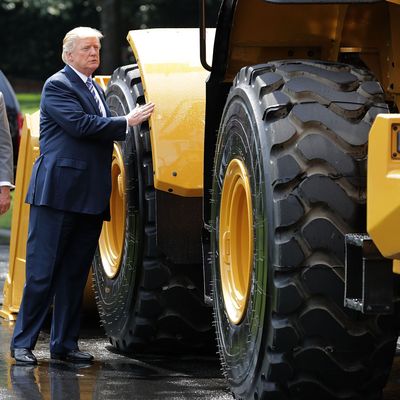
The stock market dropped today in response to negative financial news from two companies, Caterpillar and Nvidia, both of which blamed their worsening outlooks on an economic slowdown in China.
China’s economic troubles are not the president’s creation, though his trade war exacerbates them, and Caterpillar has previously blamed its rising materials costs on increased tariffs. To the extent that tariffs are hurting China’s economy, intellectually honest supporters of protectionism understand that the slowdown may rebound with negative effects on U.S. firms and U.S. consumers in the short run; this is supposed to be a necessary cost for an economic rebalancing that will benefit U.S. workers in the long run.
The reason I am skeptical of that long-run benefit is that the very real costs to American workers from the “China shock” — the opening of world trade to China and the rise of low-cost manufacturing there — mostly came in the form of onetime shifts. Americans lost jobs at manufacturing firms whose business models no longer made sense, in part due to Chinese competition, and it was hard for them to find similarly remunerative employment in middle age because they lived in the wrong places and had the wrong skills to change careers.
Reordering the global trading system again would not recover the position of workers who lost out in the last shift, many of whom are now past retirement age, and would threaten to impose a new set of costly onetime shifts. This time, Americans who work in industries that have benefited from trade with China, like agriculture or even certain parts of the manufacturing sector, would stand to lose.
The key observation in the China shock paper by the economists David Autor, David Dorn, and Gordon Hanson is that structural economic changes are hard on workers: They invested in one kind of human capital and find it hard to transform that investment when economic circumstances change. It takes a long time for long-run benefits to materialize. That was true of the rise of China as a global economic power and it would also be true of a change that significantly repositions our relationship with China today.





























